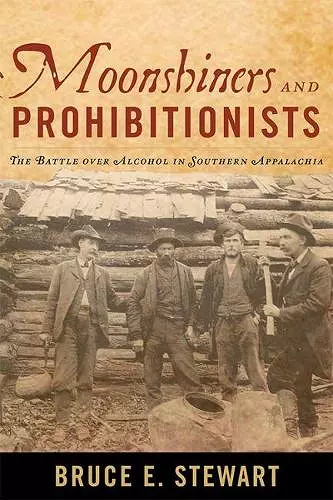Moonshiners and Prohibitionists
The Battle over Alcohol in Southern Appalachia
Format:Paperback
Publisher:The University Press of Kentucky
Published:31st Aug '18
Currently unavailable, and unfortunately no date known when it will be back

Homemade liquor has played a prominent role in the Appalachian economy for nearly two centuries. The region endured profound transformations during the extreme prohibition movements of the nineteenth century, when the manufacturing and sale of alcohol -- an integral part of daily life for many Appalachians -- was banned.
In Moonshiners and Prohibitionists: The Battle over Alcohol in Southern Appalachia, Bruce E. Stewart chronicles the social tensions that accompanied the region's early transition from a rural to an urban-industrial economy. Stewart analyzes the dynamic relationship of the bootleggers and opponents of liquor sales in western North Carolina, as well as conflict driven by social and economic development that manifested in political discord. Stewart also explores the life of the moonshiner and the many myths that developed around hillbilly stereotypes.
A welcome addition to the New Directions in Southern History series, Moonshiners and Prohibitionists addresses major economic, social, and cultural questions that are essential to the understanding of Appalachian history.
Stewart addresses major economic, social, and cultural questions that are central to our understanding of the history of Appalachia."" - Gordon B. McKinney, author of Southern Mountain Republicans, 1865-1900
""Stewart uses the alcohol debate in southern Appalachia to add fresh insights into the understanding of southern history and expand the breadth of alcohol studies research.""- Choice
""Stewart offers readers a unique perspective on the consequences of Appalachia's political, economic, and social transformation during the 19th century and its impact on the communities and residents of western North Carolina."" - Appalachian Journal
""Though many historians have emphasized the role that outsiders played in developing popular Appalachian stereotypes, Stewart reveals that early anti-liquor crusaders in the region's towns contributed their share as well.""- West Virginia History
""Stewart tracks important shifts in popular sentiment, politics, and laws about making and drinking alcohol from the early 1800s to the early 1900s."" - Now and Then
""The author contends that distillers played a vital economic role in the isolated mountain communities. It was this geographical isolation that made moonshining profitable...Stewart does a fine job of telling his story."" - The North Carolina Historical Review
""This insightful book is certain to serve as a model for future studies on the antiliquor movement."" - The Journal of American History
""A fresh and insightful study that makes a significant contribution to our understanding of the Appalachian South, the antebellum and post-bellum temperance movements, and the wider South. This fascinating work will certainly generate lively discussions."" - Journal of East Tennessee History
""In this masterly study Bruce E. Stewart explains a facet of the antiliquor crusade that scholars have ignored, namely, the changing perception people had of alcohol distillers: from manufacturers of a legitimate product to impediments to economic and social progress."" - Journal of American History
""Sheds light on a region and a topic that have been egregiously under-examined. Regional studies such as his offer a more nuanced understanding of the historical liquor question in modern America."" - American Historical Review
""Perhaps the greatest achievement of Moonshiners and Prohibitionists is that it wrestles with the topic of moonshine as a serious academic subject."" - Gastronomica
""Moonshiners and Prohibitionists is a much-needed contribution to our understanding of the complex social, economic, religious, and cultural issues underlying the prohibition impulse that swept the South between 1880 and 1920."" - Journal of Southern History
ISBN: 9780813176192
Dimensions: unknown
Weight: unknown
340 pages